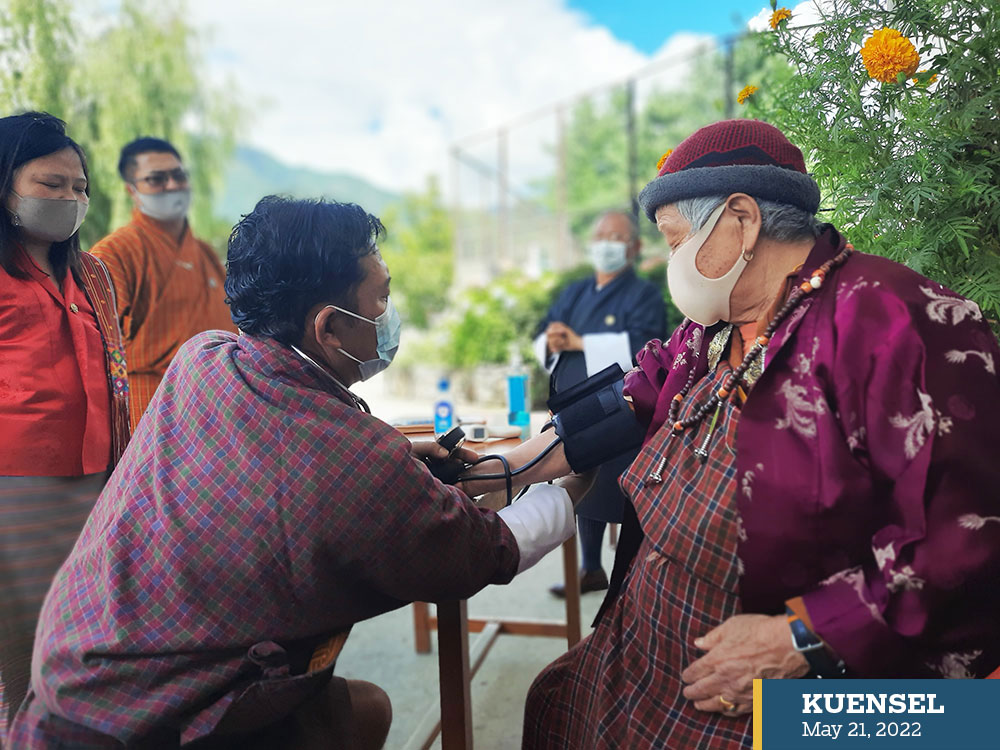Yangyel Lhaden
To improve the care and protection of senior citizens, the Gross National Happiness Commission (GNHC) secretariat is working on formulating the National Policy for the Senior Citizens. It is expected to be launched in October.
Few available studies from National Statistics Bureau (NSB) 2017 show that senior citizens face financial problems, food insufficiency, landlessness, debt burden, abandonment, disrespect, discrimination, and social exclusion in some aspects.
According to NSB 2017 report 30 percent live in a poor shelter, 22 percent do not own land, 15 percent are debt-ridden, 26 percent of them face food insufficiency and 63 percent have a financial problem.
Senior Policy Researcher with GNHC, Karma Tshering Samdrup said that currently, there was no dedicated care for the older population because there was no specific legislation or financial support system, and there were policy gaps.
Karma Tshering Samdrup said that as per the population projection of older people from the Population and Housing Census of Bhutan 2017 (PHCB) it is time to formulate a policy for senior citizens.
“The policy recommends productive ageing, health care and protection, safety and security, housing and age-friendly services, and welfare for our senior citizens,” he said.
He said that senior citizens programmes at the initial stage were limited to declaring October as Senior Citizens Day, integrated health care screening for elderly citizens, priority counters at health centres and banks, and elderly care programme under the health ministry.
The proportion of the elderly population, those who are 65 years and above, increased from 4.7 percent (29,745) to 5.9 percent (43,064) between 2005 and 2017.
PHCB projection shows in 2022, the elderly population in Bhutan has 50,715 older people amounting to 6.7 percent of the population and it is expected to increase to 13.4 percent (118,650) by 2047 making the country an “aged” society.
Head of United Nations Population Fund, Phuntsho Wangyel said that according to UNFPA population projection, if 60 years is considered as cut off age for the elderly population, the elderly population would outnumber the children population by 2047.
“Declining fertility rates and longer life expectancy are causing unprecedented growth in the proportion of the older population,” he said.
He said, therefore, there are growing calls for senior citizens to be recognised as a distinct community deserving of special care and attention, rights, and an increased focus on the right of senior citizens.
To guide policy formulation, GNHC in collaboration with the health ministry and the Royal Society for Senior Citizens with funding from UNFPA conducted a one-day meeting involving stakeholders from Zhung Dratshang, armed forces, non-government organisations, civil society organisations (CSO), Office of Attorney General, and senior representatives.
The representatives suggested introducing old age homes, incentives to care for the old, and universal basic income to senior citizens through the policy.
Pema Lhamo, a representative from a CSO said that an old age home should be one of the options to take care of the old. “Incentives to care for parents should be made available to children just like parents getting maternity and paternity leave.”
Leytshog Drungchen with Zhung Dratshang, Ugen Namgyal said that the policy should address ageing productively. “Pension should not only be limited to the civil servants, corporate employees, and private individuals which is only a small percent of the population.”
He said that a policy recommendation and different schemes of pension should be made available to benefit the larger population. “I am hopeful the proposal I am working on pension for monks and nun under Zhung Dratshang would be able to take care of ageing population in monastic body.”
Sonam Tshewang, a retired civil servant, said that the policy should capture the whole ageing population of present and future, “Old people of my age are closed-minded but now there is emerging old, they are open-minded and future old people will be even more modern.”
Phuntsho Wangyel said that the policy intervention should ensure senior citizens remain healthy, active, and productive in their advanced years. “It should be comprehensive enough to take into consideration the diversity of situation and needs of the senior citizens.”
He said that the policy should also address eliminating age discrimination, promoting positive ageing, and securing their right to comprehensive and high-quality services.
The GNHC secretariat is conducting a series of policy formulation workshops and focus group discussions and presentations to different sectors before the policy finalisation on September.


